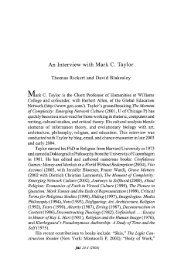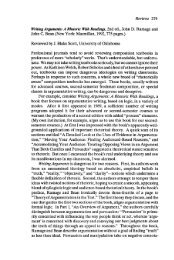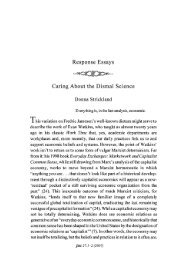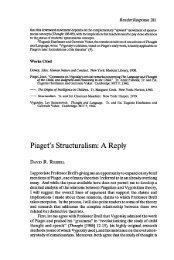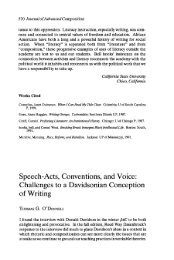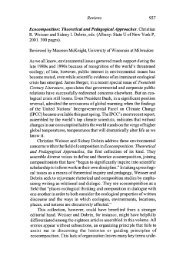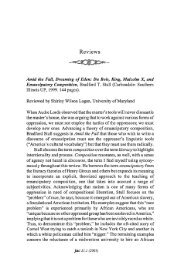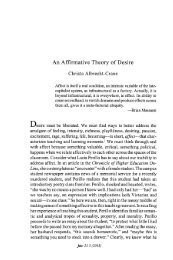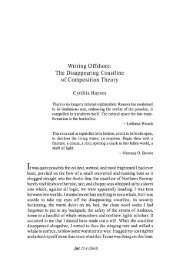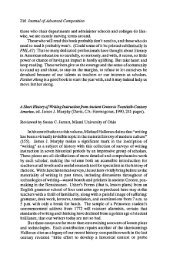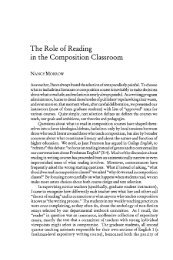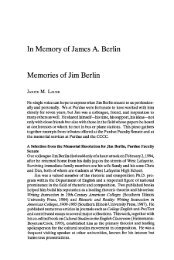Politics, Pedagogy, and the Profession of Composition ... - JAC Online
Politics, Pedagogy, and the Profession of Composition ... - JAC Online
Politics, Pedagogy, and the Profession of Composition ... - JAC Online
Create successful ePaper yourself
Turn your PDF publications into a flip-book with our unique Google optimized e-Paper software.
148 jac<br />
fast capitalism, for example, may have very different meanings <strong>and</strong><br />
effects in <strong>the</strong>ir specific concrete enactments. After all, we should not, for<br />
example, condemn all instances <strong>of</strong> cooperation simply because some<br />
version <strong>of</strong> such a "skill," understood abstractly, is desired by fast capitalist<br />
gurus. That it may <strong>and</strong> has been used to serve fast capitalist ends does not<br />
mean it must <strong>and</strong> can serve only such ends. To draw such a conclusion<br />
would be to mistake <strong>the</strong> exchange value <strong>of</strong> our work for its full potential<br />
value. And, secondly, as Tuman's analysis hints, practices condemned or<br />
viewed with suspicion as traditional, authoritarian, or hierarchical may in<br />
fact have effects contradictory to <strong>the</strong>ir received meanings. Just as we are<br />
learning to see "open" classrooms, for example, as less open than <strong>the</strong>y<br />
appear, so we must reconsider <strong>the</strong> politics, broadly construed, <strong>of</strong> practices<br />
in composition condemned for <strong>the</strong>ir repressiveness. This reconsideration<br />
must apply not only to composition's pedagogies but to all its practices.<br />
The practice <strong>of</strong> our politics, <strong>and</strong> <strong>the</strong> politics <strong>of</strong> our practices, must be<br />
approached not as commodities but as contingent relations. If this<br />
sometimes makes for less visibly, less recognizably "political" work, it<br />
can also allow us to work in more politically responsible, materially<br />
responsive ways: to engage not just <strong>the</strong> politics <strong>of</strong> pedagogy, not just <strong>the</strong><br />
politics <strong>of</strong> work <strong>and</strong> <strong>the</strong> workplace, but <strong>the</strong> working <strong>of</strong> power in both. 12<br />
Notes<br />
Drake University<br />
Des Moines, Iowa<br />
1. Luke herself argues that this second view restricts feminists to <strong>the</strong> "good<br />
girl" posture <strong>of</strong> maternal, nurturing, self denial ("Feminist <strong>Pedagogy</strong>" 284, 298-<br />
302).<br />
2. Ironically, it is just such a discourse that Brodkey <strong>and</strong> her colleagues<br />
intended to counter in <strong>the</strong>ir course through teaching argument "as inquiry ra<strong>the</strong>r<br />
than advocacy," an intention so at odds with conventional underst<strong>and</strong>ings <strong>of</strong><br />
political discourse as to be unimaginable to opponents (239-41).<br />
3. For a full-length account <strong>of</strong> a composition pedagogy focusing explicitly<br />
on <strong>the</strong> ubiquity <strong>of</strong> <strong>the</strong> political in writing, see Fox's The Social Uses.<br />
4. For examples <strong>of</strong> <strong>the</strong> response to Ellsworth's account, see Giroux;<br />
McLaren; Burbules <strong>and</strong> Rice; La<strong>the</strong>r; <strong>and</strong> Leach.<br />
S. Ellsworth restricted her research on critical pedagogy to thirty articles in<br />
"major educational journals" published between 1984 <strong>and</strong> 1988 (298 n. 2), a<br />
restriction that has been criticized by Giroux (178) <strong>and</strong> McLaren (72).<br />
6. For a different account <strong>of</strong> black ambivalence toward schooling, see hooks<br />
98-100.



